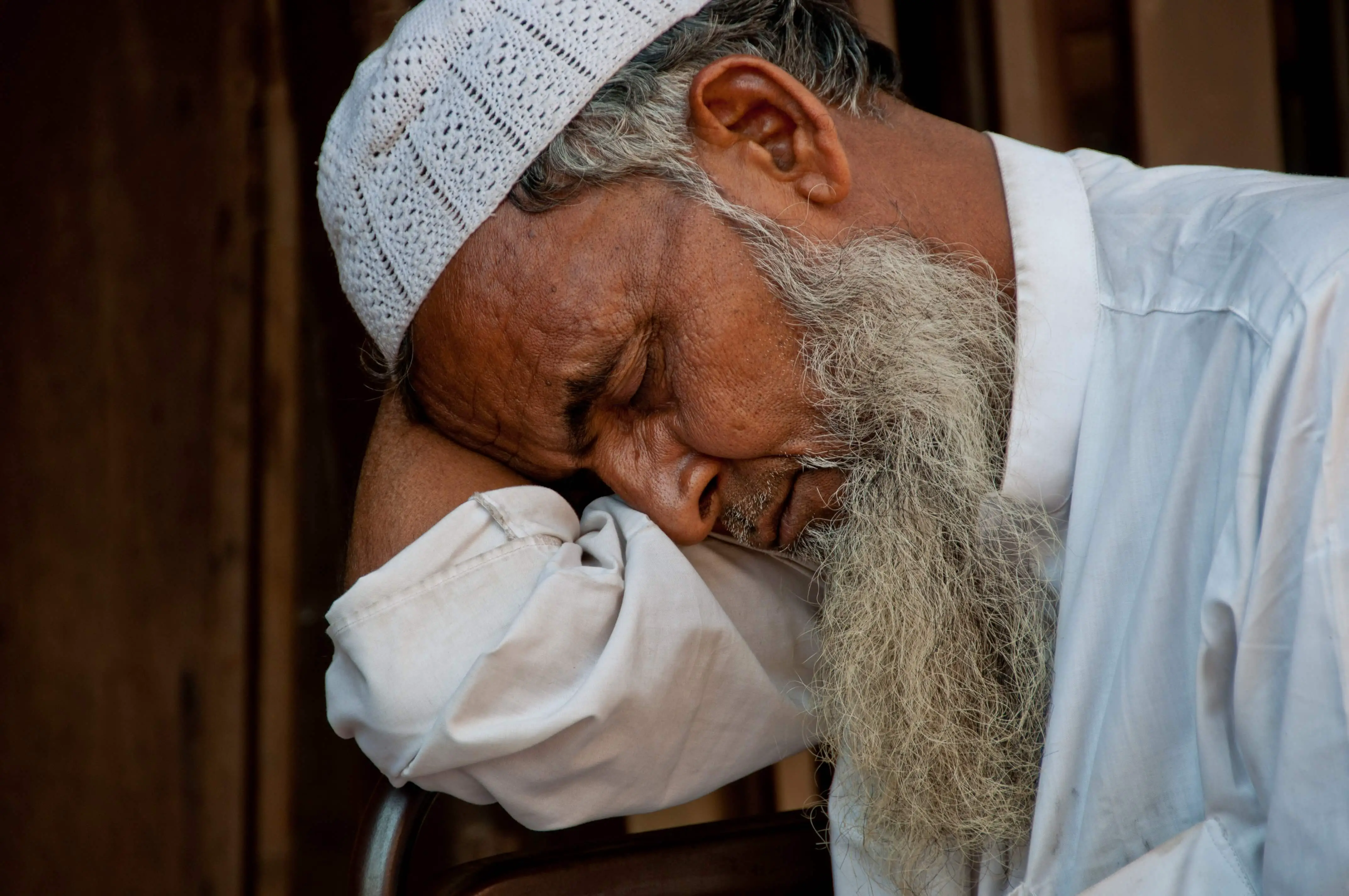How should those affected by the death of a loved one mourn/grieve the loss?
One should observe a formal grieving period for no more than three days1 unless the person grieving is the wife of the deceased. During this time, it is important to make the necessary arrangements for the funeral. The three days doesn’t mean that the person who experienced the loss isn’t allowed to be sad after three days. Rather, the mourning period should not be unnecessarily prolonged, and the person affected should aim to return back to some sense of normality/routine. Many of the challenges related to the loss of a loved one can be highly disruptive from multiple perspectives (e.g., financial, emotional, legal), and it is normal for many of these challenges to take time to resolve or mitigate.
Some losses take months, years, or even lifetimes to process. Islam doesn’t govern your feelings of sadness.
Related: Iddah: How to Navigate Spouse Grieving Period
Can I cry at the loss of a loved one?
Grief and crying at loss are natural reactions and a part of life.
In the Muslim community, “having sabr” or patience is the advice given to someone who is grieving or crying. This idea of having sabr is usually presented as an alternative to grieving, rather than, when grieving, also being patient.
This idea of having only sabr, patience, is often derived from the Hadith, where Anas b. Malik reported that Allah’s Messenger (ﷺ) came to a woman who had been weeping for her (dead) child, and said to her:
Fear Allah and show endurance. She (not recognizing him) said: You have not been afflicted as I have been. When he (the Holy Prophet) had departed, it was said to her that he was the Messenger of Allah (ﷺ), she was mortally shocked. She came to his door and she did not find doorkeepers at his door. She said: Messenger of Allah. I did not recognise you. He said: Endurance is to be shown at first blow, or at the first blow.
The Hadith is often interpreted as meaning to never grieve or mourn when someone experiences loss. Rather, having sabr, patience, at the first sign of loss means a person doesn’t behave or say things that go against Islam or God2.
In fact, even the Prophet Muhammad (S) grieved at the loss of his son. It was narrated by Anas bin Malik:
We went with Allah’s Messenger (ﷺ) (p.b.u.h) to the blacksmith Abu Saif, and he was the husband of the wet-nurse of Ibrahim (the son of the Prophet). Allah’s Messenger (ﷺ) took Ibrahim and kissed him and smelled him and later we entered Abu Saif’s house and at that time Ibrahim was in his last breaths, and the eyes of Allah’s Messenger (ﷺ) (p.b.u.h) started shedding tears. `Abdur Rahman bin `Auf said, “O Allah’s Apostle, even you are weeping!” He said, “O Ibn `Auf, this is mercy.” Then he wept more and said, “The eyes are shedding tears and the heart is grieved, and we will not say except what pleases our Lord, O Ibrahim ! Indeed we are grieved by your separation.”3
In another instance, it was narrated that Abu Hurairah said:
“The Messenger of Allah visited the grave of his mother and wept, and caused those around him to weep. He said: ‘I asked my Lord for permission to pray for forgiveness for her and He did not give me permission, and I asked Him for permission to visit her grave and He gave me permission, so visit the graves, for they will remind you of death.”‘4
These Hadith demonstrate that grief and crying are allowed in Islam and can be a form of mercy. However, acting or behaving in a way that goes against the confines of Islam is what is not allowed and where sabr, patience comes into play5.
For example, the Prophet Muhammad (S) forbade the practice of wailing, which is different from the crying highlighted above. Wailing is to raise your voice while crying with phrases that are theologically problematic (e.g., how am I going to survive without you, we are hopeless without you). In essence, these phrases attribute God-like attributes and are devoid of the core belief that Allah is our ultimate Provider and Sustainer. This type of cry can often also be accompanied by physical acts of self-harm and pain (e.g. beating chest/face/etc, tearing of clothes, shaving/pulling hair), which are also prohibited.6
In fact, if the loss is too crippling and a person falls into depression, then they should seek the help of a therapist to help process their grief. The grieving party should not be ashamed to reach out for help or feel like they need to bury their feelings because it is “un-Islamic” to feel these emotions.
What are recommended ways to benefit the deceased?
The concept of sending a reward to the deceased is known as Isaal-e-Sawaab7.
It can be done in 2 ways:
- Through charitable financial deeds
- Through physical deeds
Scholars agree that doing charitable financial deeds on behalf of the deceased is allowed.
However, there is a difference of opinion on if the reward of doing physical deeds can be given to the deceased. For example, reciting Qur’an, doing Tawaf, dhikr, fasting, sacrificing an animal on behalf of the deceased, etc.
The Hanafi, Hanbali and some of the Shafi and Maliki scholars agree that this is allowed. However, not all Shafi or Maliki scholars agree it is allowed to do physical deeds on behalf of the deceased.
Sending rewards for physical actions occurred during the lifetime of the Prophet Muhammad (S). The narration by Ibn `Abbas (R) is used to support this position.
A woman from the tribe of Juhaina came to the Prophet (ﷺ) and said, “My mother had vowed to perform Hajj but she died before performing it. May I perform Hajj on my mother’s behalf?” The Prophet (ﷺ) replied, “Perform Hajj on her behalf. Had there been a debt on your mother, would you have paid it or not? So, pay Allah’s debt as He has more right to be paid.”8
If there are practices for the deceased that fall outside of the bounds of Islam, then they should be avoided so that there is no distortion done to the religion.
References
- A Practical Guide to Funeral Rites in Islam by Maulana Ebrahim Noor, pg. 44
- A Practical Guide to Funeral Rites in Islam by Maulana Ebrahim Noor, pg. 43
- https://sunnah.com/muslim:926b
- https://sunnah.com/nasai:2034
- “Be Prepared: Understanding the Wisdom of Calamities” by Shaykh Abdul-Rahim Reasat
- Advice on Death of a Loved One & Islamic Ruling on Idda, Yasir Qhadi, 7:15
- “Passing reward to others, living or deceased (Isaal-e-Thawab)” by Mufti Ebrahim Desai
- Sahih Bukhari, Hadith 1852




